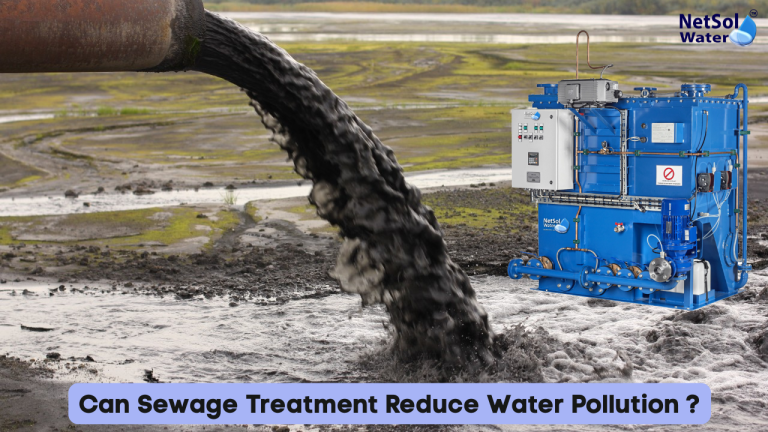
Today water pollution ranks among the world’s most destructive issues because it harms ecosystems and human health and hinders access to clean drinking and recreational water. Toxic chemicals together with bacteria and other pollutants in untreated sewage serve as one of the main sources of water contamination. The situation would resolve with proper sewage treatment. The fundamental question is can sewage treatment reduce water pollution and the answer is a clear yes. In this blog we will discuss about Can Sewage Treatment Reduce Water Pollution.
What is Sewage Treatment?
Wastewater treatment comprises a complete sequence used to eliminate various contaminants present largely within domestic, commercial and industrial waste products. The treatment method needs physical biological and chemical approaches to eliminate harmful substances such as solids bacteria chemicals and organic matter from water.
Water treatment plants known as sewage treatment plants receive wastewater to conduct multiple stages of cleaning which result in purified water. Treatment processes cleanse water to levels where it becomes safe for environmental discharge or can enter new cycles of reuse.
How Sewage Treatment Works to Reduce Water Pollution
Treatment of sewage stands as a fundamental step which defends water resources from getting polluted by unprocessed waste. This method successfully reduces dangerous effects of wastewater through its main contaminant removal phase.
1) Removal of Organic Matter
Sewage transports solid waste, fats, oils, detergents, and chemicals. Unless treated, these contaminants blend into rivers and lakes and pose health threats to animals and humans. Through the removal of these harmful substances, sewage treatment can reduce water pollution and sustains a safe environment.
2) Removal of Pathogens
Untreated sewage generally consists of harmful pathogens such as bacteria, viruses, and parasites that cause diseases. Untreated sewage that is discharged into water bodies harbors such pathogens, which have a serious health implication for animals and human life.
Treated sewage water becomes pathogen-free through biological and chemical treatments implemented at sewage treatment plants. Water supply contamination for drinking purposes becomes eliminated by implementing these prevention methods.
3) Reduction of Nutrient Pollution
The presence of nitrogen together with phosphorus in sewage originates from human waste and industrial manufacturing processes. Large amounts of nutrients that flow into water bodies trigger eutrophication through excessive algae growth. The algae present in the water reduce the oxygen levels until entire regions remain without any living aquatic organisms.
Sewage treatment plants eliminate or reduce nitrogen and phosphorus concentrations to resolve this issue during their processes. The mitigation of nutrient pollution protects water bodies from ecosystem dysfunction as well as harmful nutrient effects.
4) Elimination of Heavy Metals and Hazardous Chemicals
Heavy metals such as mercury and lead and cadmium enter wastewater streams from particular industrial operations as do hazardous chemicals which include pesticides alongside solvents. Such hazardous substances are toxic to all aquatic organisms and they stay trapped within the marine food system creating various negative health consequences affecting human beings.
The sewage treatment plants perform both chemical and physical processes which extract toxic compounds from wastewater before releasing effluent. Purified water releases back to the environment following toxic contaminant elimination through chemical precipitation and filtration together with activated carbon adsorption as a tertiary treatment process.
The Role of Advanced Sewage Treatment Technologies
Modern sewage treatment technologies developed during recent years have significantly enhanced the capability of treatment plants to limit water pollution. Some of these technologies are:
1) Membrane Bioreactors (MBR)
The combination of biological treatment with membrane filtration in MBR processes produces clean water end-products that allow both reuse and safe environmental discharge. The technology specifically supports businesses that need highly controlled water quality standards.
2) Constructed Wetlands
The wastewater treatment solution of constructed wetlands makes use of natural processes to purify water as it moves through a series of plants and soil which extract undesirable substances. This process implements sustainable practices in addition to minimizing environmental water pollution throughout rural and low-density areas.
3) Reverse Osmosis (RO)
The reverse osmosis process serves as an outstanding method to eliminate salts and heavy metals together with various dissolved solids from wastewater. The technology finds its growing application in sewage management to produce treated water of improved quality.
Advantages of Sewage Treatment to Minimize Water Pollution
High levels of water pollution reduction become possible through the installation of sewage treatment systems. Some advantages are as follows:
a) Limiting waterborne disease transmission through sewage treatment leads to decreased epidemics thus improving the overall health of the public.
b) Appropriate wastewater treatment protects aquatic ecosystems because it sustains water body ecological stability thus preventing death among aquatic life and biodiversity loss.
c) Post-treatment sewage processes enable particular water reuse applications because it becomes suitable for irrigation and industrial needs and management which minimizes water consumption.
Through appropriate sewage treatment plants businesses and municipalities can reach necessary environmental requirements for wastewater discharge so they follow local regulations and prevent penalties.
Conclusion
Sewage treatment reduces water pollution through the elimination of toxic compounds in wastewater before discharge. The treatment process produces water that is of better quality while protecting aquatic life and safeguarding public health. Advanced sewage treatment solutions continue to increase their capability to destroy pollutants which leads to the prevention of water pollution worldwide.
By making investments in advanced sewage treatment plants and maintaining them in good repair, communities, industries, and municipalities can do a lot to safeguard our valuable water resources.
Do you need an advice or assistance on selecting the best water and waste water treatment unit? We have solutions for all your problems!
Let us know your problem, our experts will make sure that it goes away.
For an assistance or related query,
Call on +91-9650608473
Or write us at enquiry@netsolwater.com
